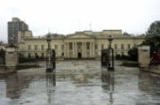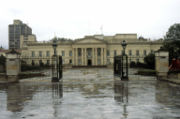
Government of Colombia
Encyclopedia
The government of Colombia
is a republic
with separation of powers
into executive, judicial and legislative branches.
Its legislature
has a congress
,
its judiciary
has a supreme court
, and
its executive branch
has a president
.
The citizens of Colombia cast votes concerning their government, and they employ a public sector office for an inspector general
to oversee the public interface of the government
. This safeguards the public, and guarantee the human rights
spelled out in the Colombian Constitution of 1991
, which provides the framework for a welfare state
and a unitary republic.
Colombia has " control institutions" which mix government and public officials, who work alongside one another. For example, the public's inspector general works closely with the government's controller general whose job it is to ensure governmental fiscal responsibility. An independent Ombudsman
deals with maladministration complaints and functions as the national human rights institution.
 The executive branch of power in Colombia is headed by the President of the republic. He is supported by the Vice President of Colombia
The executive branch of power in Colombia is headed by the President of the republic. He is supported by the Vice President of Colombia
, the ministries of Colombia. and Administrative Departments of Colombia
. The government is in charge of creating and developing politics intended to Colombia the governors of the Departments of Colombia
are elected through popular vote to represent the president and the executive branch of government at a provincial level.
Majors are subsequent to the governors, as maximum representatives of the executive branch of government at a municipal
level. Majors are also elected in regional elections along governors of departments.
is a republic
Republic
A republic is a form of government in which the people, or some significant portion of them, have supreme control over the government and where offices of state are elected or chosen by elected people. In modern times, a common simplified definition of a republic is a government where the head of...
with separation of powers
Separation of powers
The separation of powers, often imprecisely used interchangeably with the trias politica principle, is a model for the governance of a state. The model was first developed in ancient Greece and came into widespread use by the Roman Republic as part of the unmodified Constitution of the Roman Republic...
into executive, judicial and legislative branches.
Its legislature
Legislative Branch of Colombia
The Legislative Branch of Government in Colombia is one of the three branches of the government of Colombia under the Constitutional provision of separation of powers. The legislative branch of government is represented by the Congress of Colombia, which is formed by the Senate of Colombia and the...
has a congress
Congress of Colombia
The Congress of the Republic of Colombia is the name given to Colombia's bicameral national legislature.The Congress of Colombia consists of the 102-seat Senate , and the 166-seat Chamber of Representatives ...
,
its judiciary
Judicial Branch of Colombia
Judicial Branch of Government of Colombia is the system of courts in Republic of Colombia which administer justice in the name of the state as a mechanism for the resolution of disputes. The judicial branch encompasses judges, magistrates and other adjudicators who form the core of a judiciary, as...
has a supreme court
Supreme Court of Colombia
The Supreme Court of Colombia in Bogotá is the highest judicial body in civil and penal matters and issues of criminal and civil procedure in Colombia...
, and
its executive branch
Executive Branch of Colombia
The Executive Branch of Government in Colombia is one of the three branches of the government of Colombia under the Constitutional provision of separation of powers...
has a president
President of Colombia
The President of Colombia is the head of state and head of government of the Republic of Colombia. The office of president was established upon the ratification of the Constitution of 1819, by the Congress of Angostura, convened in December 1819, when Colombia was part of "la Gran Colombia"...
.
The citizens of Colombia cast votes concerning their government, and they employ a public sector office for an inspector general
Inspector General of Colombia
The Office of the Inspector General of Colombia is a Colombian independent, public institution overseeing the public conduct of those in authority or in charge of exercising a public office, and of overseeing the correct functioning of other government institutions and agencies...
to oversee the public interface of the government
Government entities of Colombia
The Government entities of Colombia are entities of the government of Colombia. The government entities is made up by commissions, control agencies, administrative departments, directorates, funds, superintendencies, among other...
. This safeguards the public, and guarantee the human rights
Human rights
Human rights are "commonly understood as inalienable fundamental rights to which a person is inherently entitled simply because she or he is a human being." Human rights are thus conceived as universal and egalitarian . These rights may exist as natural rights or as legal rights, in both national...
spelled out in the Colombian Constitution of 1991
Colombian Constitution of 1991
The Political Constitution of Colombia, better known as the Constitution of 1991, is the current governing document of the Republic of Colombia. Promulgated on July 4 of 1991 , it replaced the Constitution of 1886...
, which provides the framework for a welfare state
Welfare state
A welfare state is a "concept of government in which the state plays a key role in the protection and promotion of the economic and social well-being of its citizens. It is based on the principles of equality of opportunity, equitable distribution of wealth, and public responsibility for those...
and a unitary republic.
Colombia has " control institutions" which mix government and public officials, who work alongside one another. For example, the public's inspector general works closely with the government's controller general whose job it is to ensure governmental fiscal responsibility. An independent Ombudsman
Ombudsman's Office of Colombia
The Ombudsman's Office of Colombia is the national government agency that is charged with overseeing the protection of civil and human rights within the legal framework of the Republic of Colombia. The ombudsman, or public defender , is an official appointed by the President, and elected by the...
deals with maladministration complaints and functions as the national human rights institution.
Executive

Vice President of Colombia
The Vice President of Colombia is the first in the presidential line of succession, becoming the new President of Colombia upon leaves of absence or death, resignation, or removal of the President, as designated by the Colombian Constitution of 1991 which also reinstated the vice president figure...
, the ministries of Colombia. and Administrative Departments of Colombia
Government entities of Colombia
The Government entities of Colombia are entities of the government of Colombia. The government entities is made up by commissions, control agencies, administrative departments, directorates, funds, superintendencies, among other...
. The government is in charge of creating and developing politics intended to Colombia the governors of the Departments of Colombia
Departments of Colombia
Colombia is an unitary republic formed by thirty-two departments and a Capital District . Each department has a Governor and a Department Assembly , elected by popular vote for a four-year period. The governor cannot be re-elected in consecutive periods...
are elected through popular vote to represent the president and the executive branch of government at a provincial level.
Majors are subsequent to the governors, as maximum representatives of the executive branch of government at a municipal
Municipalities of Colombia
The Municipalities of Colombia are decentralized subdivisions of the Republic of Colombia. Municipalities make up most of the departments of Colombia with 1,119 municipalities...
level. Majors are also elected in regional elections along governors of departments.

